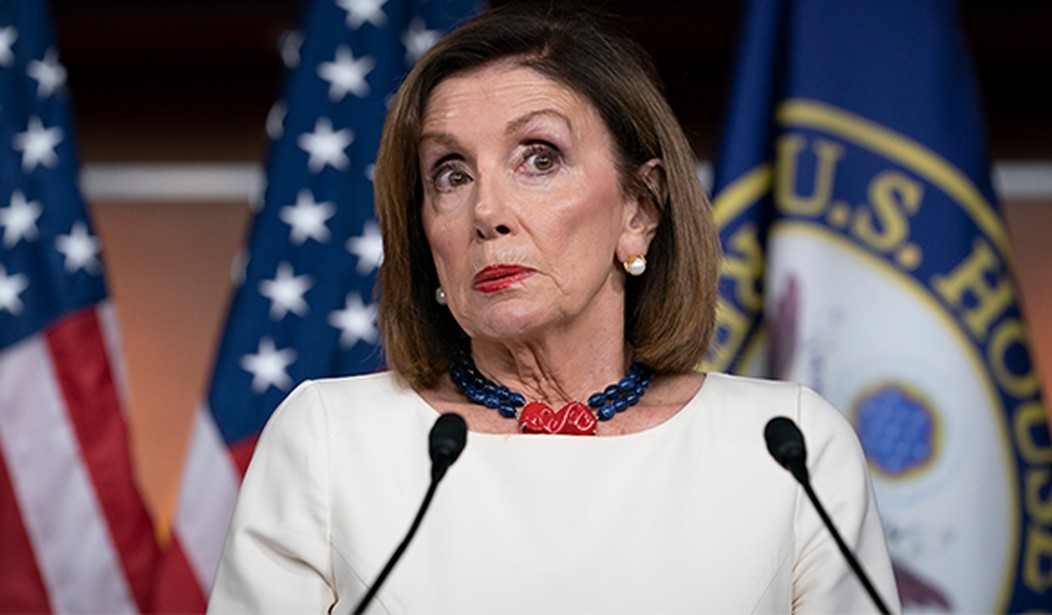"No one is above the law," said House Speaker Nancy Pelosi as she announced the Democratic effort to impeach President Donald Trump over the Ukraine matter. The phrase has become a Democratic mantra in the new impeachment push. But it could, in the end, serve to highlight the weakness of the Democratic strategy.
The reason is, by stressing that Trump is not "above the law," Democrats are basing their case against the president on the argument that he broke the law and must be held accountable. But it's not at all clear that Trump broke any laws in the Ukraine matter. In the face of a vigorous Republican defense, any argument on that question is likely to end inconclusively.
Democrats might better say, "No president is above impeachment," which lacks punch but is more accurate. Doing so, however, would emphasize the political nature of the battle and could make it more difficult for Democrats to win broad support for removing Trump. So they say, "No one is above the law." But what, exactly, does that mean?
In his analysis of the case, the intelligence community's inspector general, Michael Atkinson, wrote that Trump might have violated campaign finance laws. "U.S. laws and regulations prohibit a foreign national, directly or indirectly, from making a contribution or donation of money or other thing of value, or to make an express or implied promise to make a contribution or donation, in connection with a federal, state, or local election," Atkinson wrote.
The Democratic case is this: Trump asked Ukrainian President Volodymyr Zelensky to investigate allegations that Joe Biden and his son Hunter Biden were involved in corruption in Ukraine. Any information Zelensky provided to Trump would be a "thing of value" and thus an illegal foreign campaign contribution.
Recommended
Some experts are not buying it.
"I think it's absurd," Bradley Smith, a former Federal Election Commission chair and a frequent critic of campaign finance laws, said in an email exchange. "If a 'thing of value' were interpreted so broadly, it would mean that foreign governments are consistently violating the ban in foreign spending whenever they take official actions that may benefit one candidate or another. Similarly, Americans would have to report such activity to the FEC. That is clearly not the law."
A more practical analysis of what is wrong with applying the "things of value" standard in the Trump-Ukraine case came from, of all places, the Mueller report. Special counsel Robert Mueller's prosecutors considered charging Trump campaign officials, including Donald Trump Jr., with a campaign finance violation in relation to the infamous June 9, 2016, Trump Tower meeting. The Mueller report contained a detailed analysis of the issues involved and the reasons why the special counsel's prosecutors concluded they could not make a winning case.
The issue involved Russians offering allegedly incriminating information on Hillary Clinton to the Trump campaign. Even if Mueller believed he could convince a jury that the information was a "thing of value" -- in effect, an illegal campaign contribution -- he had to concede that "no judicial decision has treated the voluntary provision of uncompensated opposition research or similar information as a thing of value that could amount to a contribution under campaign-finance law."
Discussing the Mueller Trump Tower issue, former federal prosecutor Andrew McCarthy wrote: "So, while there might be some conceivable scenario in which acquiring information from a foreign source for use in a campaign could be a federal crime, it is highly unlikely -- so unlikely that some Type-A prosecutors wisely decided that the huzzahs they'd have gotten for indicting the president's son were outweighed by the humiliation they'd endure when the case inevitably got thrown out of court."
Weak as it is, the campaign finance violation case appears to be the Democrats' best chance of showing Trump broke the law. But there are other possible cases. Some suggest Trump might have solicited a bribe by offering foreign aid to Ukraine in exchange for dirt on Biden. That, too, would be an extraordinarily difficult argument to make.
Others suggest Trump obstructed justice -- another long shot. And still others suggest Trump was involved in a conspiracy, which would require showing not only that the president committed a crime, but that he conspired with others to do it. Yet another long shot.
The bottom line is, it will be very, very hard for House Democrats to show that Trump committed a crime in the Ukraine affair. Which is why some Democrats seem to be moving toward accusing Trump of engaging in misconduct that is more difficult to define, like violating his oath of office or betraying his country. Those are charges that seem solemn and weighty, but are also fuzzy enough to use without getting into any detailed -- and losing -- legal argument.
The Constitution says a president "shall be removed from Office on Impeachment for, and Conviction of, Treason, Bribery, or other high Crimes and Misdemeanors." There has been a very long debate on what that means. To lay ears, it sounds like the president must be shown to have committed a crime to be impeached and removed from office. But the framers did not define "high crimes and misdemeanors," and it is up to Congress to decide whether a president should be impeached, and, if so, on what grounds.
So far, Democrats have not helped their cause by accusing Trump of criminal behavior. "No man is above the law" sounds good, but it requires the impeachers to make a case that the president did, indeed, break the law. In coming days, look for Democrats to seek an easier route.
Byron York is chief political correspondent for The Washington Examiner.

























Join the conversation as a VIP Member